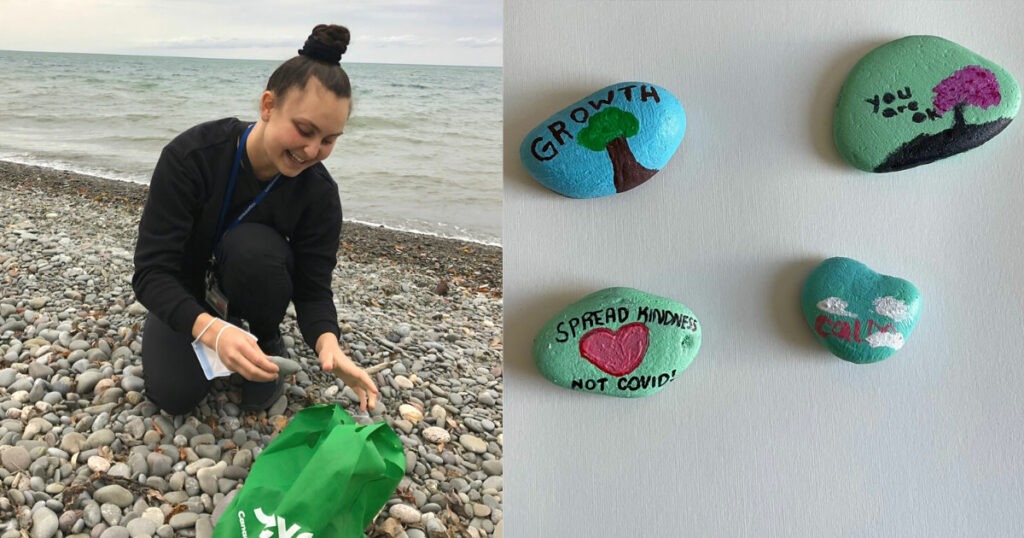Ten great things that happened this week

Each week, we share a list of 10 great things that happened at our sites. Do you have a story you’d like to share? Send it to communications@unityhealth.to.
1. How can healthcare employees help their mental health? Chantal Sinclair offers advice
At a time when mental health is the focus of so many conversations, Unity Health Toronto launched a new series where experts shared strategies to help boost mental health. Chantal Sinclair, Unity Health Toronto wellness coordinator, shared practices employees can use to interrupt negative thought patterns and focus on the present moment. “It’s important employee stress is recognized – your struggle matters and you matter. Don’t be afraid to share that you’re not doing OK and find the support you need.” Read the story.
2. St. Joseph’s recreation therapist helps counter isolation via virtual group interventions
We spotlighted Rachel Blair, a recreation therapist at St. Joseph’s adult inpatient mental health unit, who shared how virtual group activities and interventions are providing connection for patients amid the pandemic. In late December, when the Omicron variant threatened to halt group programming on the unit, staff pivoted to find a virtual solution. Within a few weeks, group programming was back up and running on Zoom. “It’s great to see patients’ faces light up when people are coming onto the Zoom group meeting and they say, ‘We can see people again!’” said Rachel. Read the profile.
3. Dr. Amol Verma speaks about AI and the future of healthcare
Dr. Amol Verma, clinician-scientist at St. Michael’s Hospital, spoke at a Globe and Mail event about artificial intelligence (AI) and the future of healthcare. Dr. Verma was part of a panel to weigh in on the use of AI in healthcare and how Canada can be better prepared to leverage the technology. Read a summary of the event.
4. Report highlights gaps in care for people who experience opioid overdose
A new report led by researchers at the MAP Centre for Urban Health Solutions captured the experience of people who overdose, including what happened, where and how others responded to help. The report was based on surveys with nearly 250 people, and included in-depth interviews with 17 people who inject drugs. The report found that of those interviewed, most who went to hospital reported negative experiences with healthcare providers. Only one person received medication to manage their withdrawal symptoms, and nobody was offered Opioid Agonist Therapy or a referral to a substance-use treatment program. Read about the report.
5. CBC News profiles Toronto’s Drug Checking Service
CBC News profiled Toronto’s Drug Checking Service, a program coordinated by The Centre on Drug Policy Evaluation at St. Michael’s Hospital. The service helps people who use drugs be aware of the content of their drugs by anonymously collecting and analyzing samples from harm-reduction agencies. The data is shared publicly in a bid to protect people who use drugs from harm.
6. St. Joseph’s social workers share mental health tips for new parents
Kira Liss and Jackie Boyce, social workers at St. Joseph’s Women and Children’s Program shared strategies to boost mental health for new parents. Kira and Jackie discussed some of the stresses new parents face and how feelings of isolation have been compounded in the pandemic. “It’s important to give yourself grace and allow yourself to feel all the feelings. Reach out to the people who love and care for you, because they really do want to help,” said Jackie. Read their tips.
7. How can we make patients’ first point of health care better? Dr. Tara Kiran shares the benefits of having a team-based model of care
Dr. Tara Kiran spoke about her recent study in the Annals of Family Medicine that examined the impact team-based care has on patients. Dr. Kiran and the research team analyzed the annual emergency department (ED) visits of approximately 2.5 million patients over a 15-year period, looking at their ED use before and after their primary care physician transferred from a fee-for-service model to either a team-based or non-team-based capitation model. The team found that while there was generally an increase in emergency department use, the increase was less overall for patients who were part of a team-based model.
8. Dr. Fahad Razak weighs in on medical exemptions for the COVID-19 vaccine
An analysis by CBC News found that less than 1 in 50,000 Ontario adults has a valid medical exemption for the COVID-19 vaccine. Dr. Fahad Razak, general internist at St. Michael’s Hospital, spoke to CBC News about how the relatively low number is a sign the verification system is working. Read the article.
9. Dr. Stephen Hwang shares insights about COVID-19 infections among homeless population
Dr. Stephen Hwang, director at the MAP Centre for Urban Health Solutions, spoke at a CanCOVID event, where he shared insights from The COVENANT Study. The cohort study examines COVID-19 among Toronto’s homeless population. Data from the study will help researchers understand the best ways to detect, prevent and manage COVID-19 in the high-risk population. Read more about the study.
10. How has Canada fared in its response to COVID-19? Dr. Prabhat Jha shares his thoughts
It’s been two years since the first COVID-19 patient was identified in Canada. Dr. Prabhat Jha, epidemiologist at St. Michael’s Hospital, joined a panel on Zoomer Radio to discuss Canada’s response to the pandemic and what lessons have been learned over the two years. Listen to the segment.
